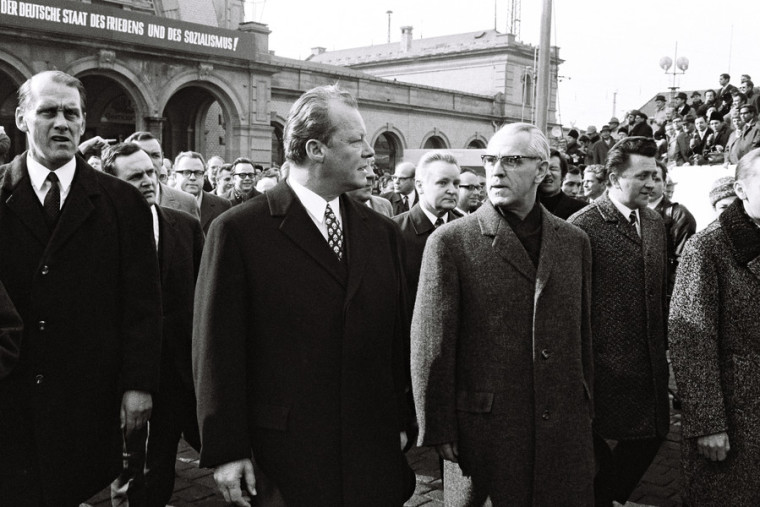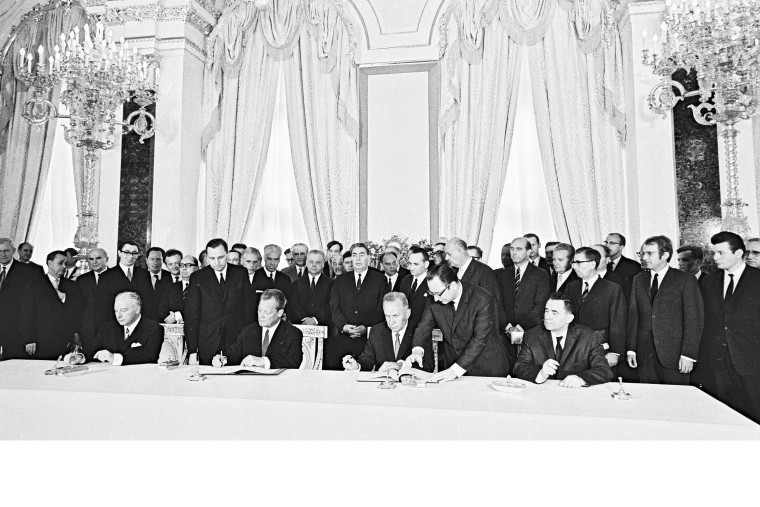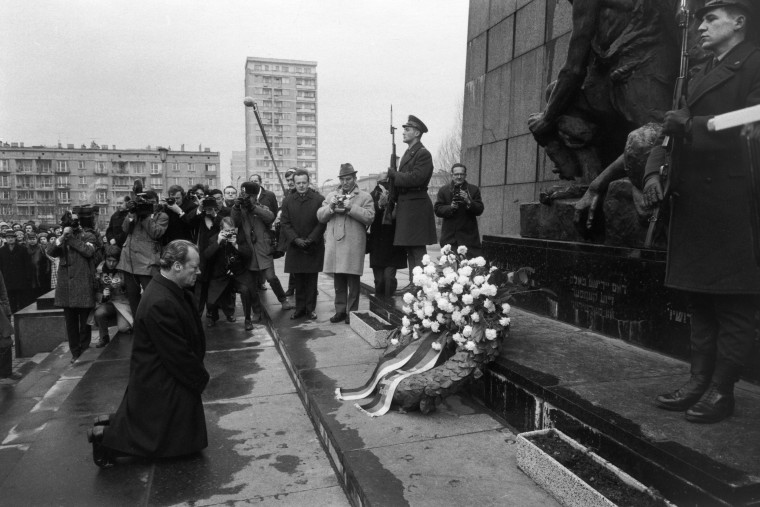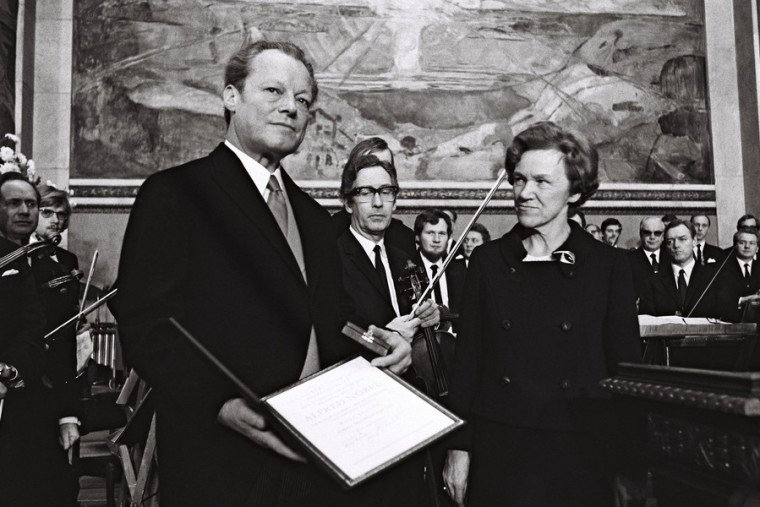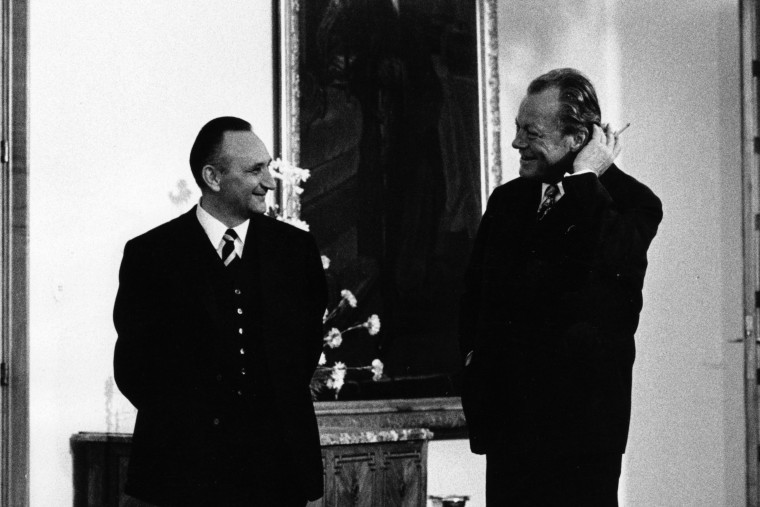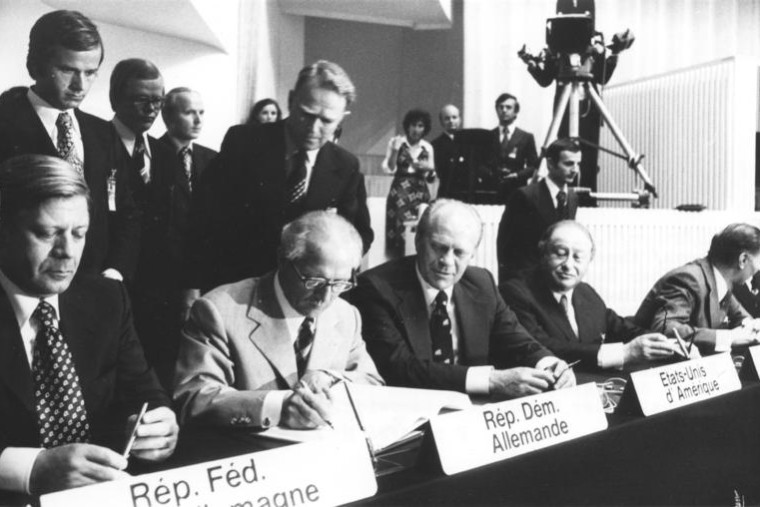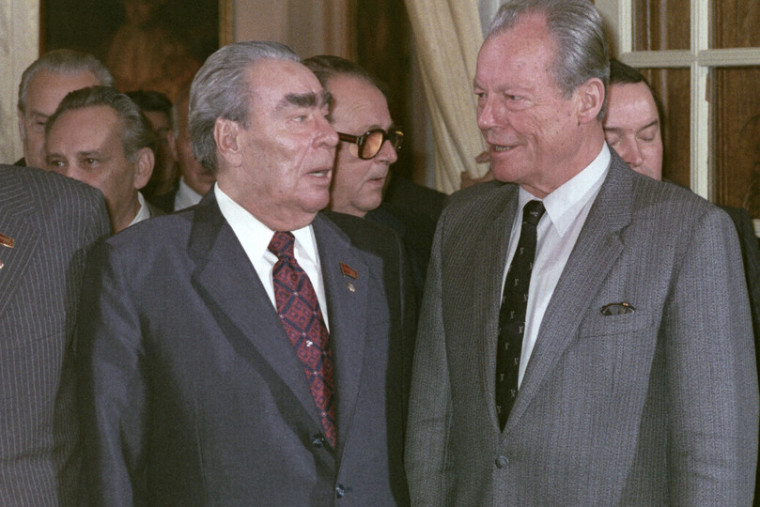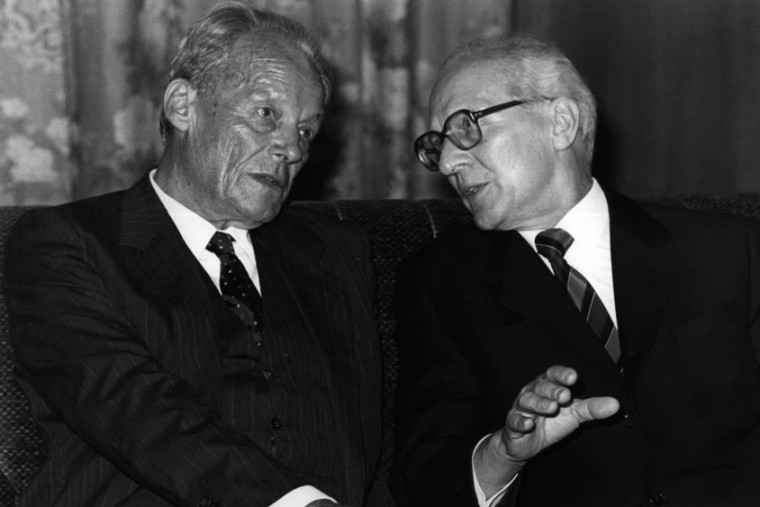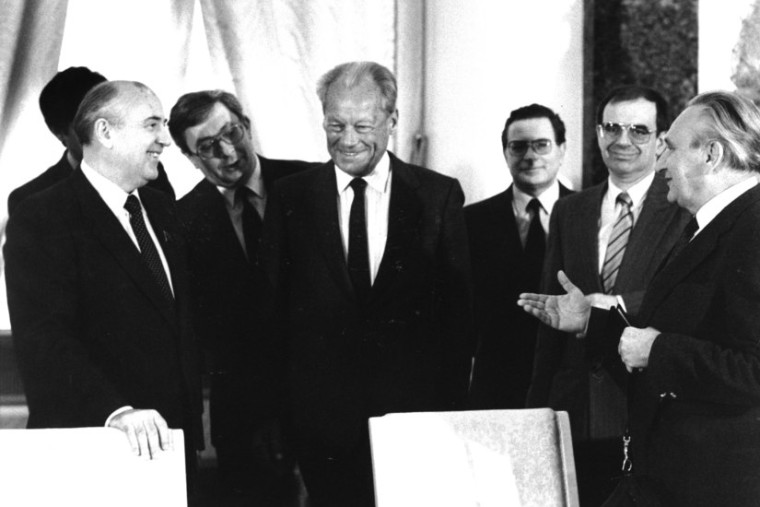Securing peace and overcoming walls – Ostpolitik and policy on Germany 1955–1989

© Polizeihistorische Sammlung Berlin
To prevent a nuclear war, as early as the mid-1950s in Berlin, Willy Brandt speaks out in favour of détente and “peaceful co-existence” between East and West. At the same time he advocates – especially after construction of the Wall in 1961 – a “policy of small steps” which should make life easier for people in divided Germany. Those are also the main goals of Federal Chancellor Brandt. His “new Ostpolitik” secures peace, supports the cohesion of the German nation and gives the impetus to reconciliation of the Germans with their Eastern European neighbours. Thereby, important conditions are created for ending the Cold War and overcoming the division of Germany and Europe.
Ideological roots in the 1950s
The roots of Willy Brandt’s thinking on Ostpolitik and the policy on Germany go back to the initial years of the Cold War which divided Germany, Europe and the world since 1948. The unsuccessful popular uprisings in East Germany in 1953 and in Hungary in 1956 convince the Berlin social-democrat that the rule of the communists cannot be eliminated with violent means if a nuclear war is to be avoided. In his opinion, the free, democratic West can contribute in the long run to overcoming the communist system in the East only with a policy oriented to détente, “peaceful co-existence” and exchanges between the blocs.
As Governing Mayor of Berlin, in 1958 Brandt calls on the Federal Republic – as complement to its integration in the West and in close consultation with its Western partners – to also conduct “Ostpolitik.” With this he means a better relationship with the Soviet Union as well as the resumption of contacts with the communist governed countries in Eastern Europe, most of all with Poland.
For the cohesion of the German nation
Also with regard to the Eastern part of Germany, Willy Brandt pleads for exchanges instead of separation. Nevertheless, he adamantly struggles against the communist SED regime in the GDR under Walter Ulbricht and passionately advocates the re-unification of Germany as a nation-state in peace and freedom. However, the social-democrat recognises early on that this goal can only be achieved at an international level and is at the same time moving more and more distantly into the future.
For this reason, as early as the mid-1950s Brandt has put the preservation of national cohesion and the alleviation of human distress caused by division at the centre of his policy on Germany. According to that, the Federal Republic should make exceptional efforts to gradually make life easier for people in divided Germany through agreements with East German authorities. At this time, Brandt still categorically rejects recognising the GDR as a state.
Berlin crisis and construction of the Wall
Meanwhile, for more than four years his ideas on détente policy are almost forced completely into the background by the Khrushchev ultimatum in late 1958 and the Berlin crisis caused by it. In this crisis, the most important goals for Willy Brandt are, for one, assuring freedom and the viability of West Berlin as well as keeping open the border to East Berlin.
Despite threats by the Soviet Union, the Western part of the city actually remains free. However, with the Berlin Wall, which the SED regime in the GDR erects with Soviet approval in 1961, the border is closed and the division cemented. The re-unification of Germany, which Federal Chancellor Konrad Adenauer (CDU) foresaw as a fruit of his policy of Western integration, appears to be more distant than ever. As a result, the German issue disappears from the international agenda for quite some time.
“Peaceful co-existence” and “change through rapprochement”
The brutal reality of the Wall virtually compels the Federal Republic and the West as a whole to rethink the policy on Germany and to begin with a new Ostpolitik. Reaching back to his own ideas from the 1950s and bolstered by US President John F. Kennedy, in lectures at Harvard in 1962 and at Tutzing in 1963, Willy Brandt advocates a “policy of peaceful co-existence,” of détente and of exchanges with the East. They are meant to secure peace in Europe and the world and, in the long run, give impetus for changes in the communist sphere of control. The Governing Mayor is supported in this thinking by his closest advisor, Egon Bahr, who would also wish to apply this policy of détente to the GDR as well and who in 1963 coins the formula “Wandel durch Annäherung” (“change through rapprochement”).
In Berlin, the primary concern for the responsible authorities in Schöneberg Town Hall is bringing about noticeable relief for families separated by the Wall. Instead of making major speeches for re-unification, Brandt and his associates in West Berlin’s senate intend to make the border more penetrable with a “policy of small steps.” For that reason, in 1963 they negotiate with the GDR government for the first time. These discussions lead to the first accord on travel passes with which hundreds of thousands of West Berliners can visit relatives in East Berlin over the 1963/64 Christmas holidays.
The Grand Coalition’ s Ostpolitik and policy on Germany
The “policy of small steps” in Berlin is the predecessor of a new policy on Germany and towards the East which in the course of the 1960s gradually develops in the Federal Republic. Starting in late 1966, the Grand Coalition in Bonn under Federal Chancellor Kurt Georg Kiesinger (CDU) effects important course corrections to which Foreign Minister and Vice Chancellor Willy Brandt and his chief of planning, Egon Bahr, make definitive contributions.
CDU/CSU and SPD endorse international détente and consider a solution of the German issue possible only in the framework of a European peace agreement. Beyond that, the coalition partners are unified in their endeavours to conclude non-aggression accords with their neighbours in Eastern Europe and to seek reconciliation with them. However, the assumption of diplomatic relations succeeds only with Romania in 1967. Under pressure from the Soviet Union, the GDR and Poland, the remaining Eastern Bloc countries reject a rapprochement with the Federal Republic.
To lead Bonn’s rapprochement policy out of a dead-end street, in 1968 Foreign Minister Willy Brandt for the first time advocates recognising the Oder-Neisse line as the Western border of Poland. But the Vice Chancellor cannot accomplish that in the Grand Coalition. Against his advice, the CDU/CSU clings to the claim that the GDR is not a state and that the Federal Republic alone represents all Germans and all of Germany. Brandt’s urgent recommendation to sign the Nuclear Non-Proliferation Treaty (NPT) is also rejected by Kiesinger and the Christian Democrats.
“New Ostpolitik” of the social-liberal coalition
From 1969 on, only the social-liberal government of Federal Chancellor Willy Brandt (SPD) and Foreign Minister Walter Scheel (FDP) dare to break old taboos. They no longer deny the existence of a second German state, the GDR, they sign the Nuclear Non-Proliferation Treaty and they relinquish Bonn’s claim to sole representation of all Germans. As the first federal German head of government, Brandt travels to the GDR in 1970 for discussions.
Renunciation of violence, respect for the inviolability of borders in Europe, reduction of tensions, securing peace, good-neighbourly relations and co-operation across blocs are the guiding principles of the so-called “new Ostpolitik” of the social-liberal government. In this, the accord which Egon Bahr negotiated with the Soviet Union in 1970 has decisive significance. The Moscow Treaty which Brandt and Scheel sign in the Kremlin, frees the way for further Eastern treaties with Poland in 1970, the GDR in 1972, and Czechoslovakia in 1973 as well as for the Four-Powers Agreement on Berlin in 1971.
Gains in international prestige and trust
With the recognition of the Oder-Neisse line as the Western border of Poland, the Federal Republic accepts the definitive loss of the former Eastern German territories as a result of the World War II which Nazi Germany began and lost. With his genuflection in Warsaw, which causes a world-wide sensation, Brandt also admits the guilt and responsibility of the Germans for the million-fold crimes of the Nazi regime. Representing his country, the Chancellor silently asks for forgiveness.
Through its “new Ostpolitik,” the Federal Republic wins prestige as a generally respected partner devoted to peace. Without calling into question its firm anchoring in the Western alliance and in the democratic countries’ community of values, it contributes concretely to reducing tensions between the blocs and lessening the danger of a military conflict. For that reason above all, Brandt receives the Nobel Peace Prize in 1971. In domestic politics, the “new Ostpolitik” is intensely controversial. The CDU/CSU opposition and the “Vertriebenenverbände” (organisations of the expellees) fiercely oppose the Eastern treaties.
Adherence to the goal of German unity
The SPD-FDP coalition respects the political status quo in Europe without, however, giving up on the goal of re-establishing German unity. Willy Brandt unshakably holds firmly to the right of Germans to self-determination. For him and his government, a full recognition of the GDR by the Federal Republic in terms of international law remains completely out of the question. As the Federal Chancellor points out, the two German states cannot be foreign countries to one another.
The establishment of relations between Bonn and East Berlin facilitates arrangements in intra-German travel, visits and postal traffic, which result in notable improvements for millions of Germans. The easing of conditions in everyday lives of people and the securing of bonds and ties between the Federal Republic and West Berlin preserve and strengthen the cohesion in divided Germany.
International détente and its limits
With the beginning of talks on Mutual and Balanced Force Reductions (MBFR) and the Conference on Security and Co-operation in Europe (CSCE), in 1973 Ostpolitik moves from the bilateral to the multilateral phase. The highlight of international détente is the CSCE Final Act of Helsinki in 1975. In this, the 35 European and North American signatory countries pledge above all to recognise the inviolability of borders in Europe, to not interfere in the internal affairs of other countries and to respect human rights.
Willy Brandt and Egon Bahr envision that confidence-building measures and disarmament could lead to a new system of security and eventually to a European peace settlement as well. However, this hope is not fulfilled in the 1970s. After 1975, détente policy gradually slides into crisis-mode.
“Second Cold War” and “second phase of Ostpolitik”
Due to the Soviet invasion of Afghanistan in 1979, the crisis in Poland in 1980/81 and the nuclear arms race of the superpowers at the beginning of the 1980s, the East-West conflict intensifies anew. In the “second Cold War,” the central focus for Willy Brandt is the prevention of a nuclear war, which would destroy everything. Starting in 1983, the SPD and its chairman, who are again in the opposition in the Federal Republic, more intensely seek dialogue with the communist rulers in the Eastern Bloc. The goal of this “second phase of Ostpolitik” is to revitalise détente, to promote disarmament and to develop elements of a European peace settlement.
The Federal German social-democrats negotiate with the SED, the ruling communist party in the GDR, on nuclear and chemical weapons free zones in Central Europe. The agreements arising from them are highly controversial, however. This is also the case for their co-authored position paper “Der Streit der Ideologien und die gemeinsame Sicherheit“ (“The Conflict of the Ideologies and Common Security”), which SPD and SED publish in 1987. On Willy Brandt’s initiative, the SPD establishes high-ranking contacts in the 1980s with communist parties in Poland, Hungary, Czechoslovakia and the Soviet Union. As once was the case with Soviet General Secretary Leonid Brezhnev, Brandt also establishes close relations with his latest successor, Mikhail Gorbachev, who comes to power in Moscow in 1985. Brandt enthusiastically welcomes and supports Gorbachev’s disarmament initiatives and reform policies.
Little contact to the opposition in Eastern Europe
Willy Brandt takes a reserved stance toward the Eastern European civil rights movements which refer to the CSCE Final Act and demand respect for human rights in their countries. On the one hand, he has much sympathy for the Czechoslovakian “Charta 77” and the Polish trade union, “Solidarność.” On the other hand, he does not want to interfere into the internal affairs of Eastern Bloc countries. So as not to jeopardise his good relationships with government leaders there, Brandt avoids any public advocacy for opposition forces.
In the case of Poland, at the beginning of the 1980s, the SPD chairman fears a Soviet military intervention, as last happened in 1968 in Czechoslovakia, for which he does not wish to supply a pretext. Though, Brandt encounters considerable criticism for having reacted moderately to the imposition of martial law in 1981 and for not having met during his visit to Poland in 1985 with Solidarność leader, Lech Wałęsa.
References to literature:
Willy Brandt – Berliner Ausgabe, Bd. 6: Ein Volk der guten Nachbarn. Außen- und Deutschlandpolitik 1966–1974, bearb. von Frank Fischer, Bonn 2005.
Willy Brandt – Berliner Ausgabe, Bd. 9: Die Entspannung unzerstörbar machen. Internationale Beziehungen und deutsche Frage 1974–1982, bearb. von Frank Fischer, Bonn 2003.
Willy Brandt – Berliner Ausgabe, Bd. 10: Gemeinsame Sicherheit. Internationale Beziehungen und deutsche Frage 1982–1992, bearb. von Uwe Mai, Bernd Rother und Wolfgang Schmidt, Bonn 2009.
Wolfgang Schmidt: Willy Brandts Ost- und Deutschlandpolitik, in: Bernd Rother (Hrsg.): Willy Brandts Außenpolitik, Wiesbaden 2014, S. 161–257.
